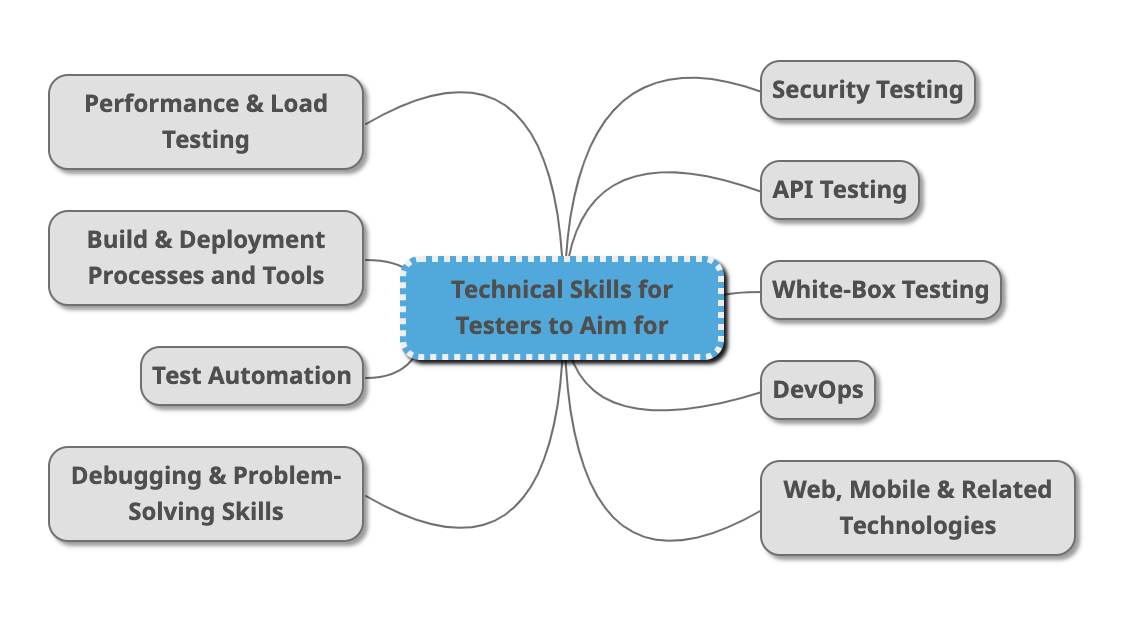What is Software Testing?
Testing the application's software is the last stage in the production process. The code's functionality is evaluated to determine how effectively the program has been tested. This review might be finished quickly or continue until everyone is satisfied with the results. Finding defects and issues early in the development process via Software Testing allows these issues to be resolved before the product is made available to the public. Customers will be happy and have greater self-assurance due to this approach since it guarantees they will only get high-quality items.
To understand how crucial Software Testing is, consider the coffee shop Starbucks. The firm's point-of-sale (POS) platform crashed in 2015, losing millions of dollars in sales. The incident was triggered by a software problem that resulted in a faulty system upgrade. This might have transpired only if the POS software had been subjected to exhaustive testing. As a result of a software bug affecting the airbag sensor detectors, Nissan was forced to recall over 3 million vehicles in the year 2016. A situation quite similar to this one occurred with Toyota in 2009.
Types of Software Testing
There are several forms of Software Testing, each with its objectives and methods:
- Acceptance testing is the process of determining if the whole system functions as planned.
- Integration testing ensures that all of the software's elements and functionalities can communicate.
- Unit testing is the practice of ensuring that each component of software functions properly. The minor testable element of an application is called a unit.
- Functional testing is the process of guaranteeing functioning by simulating various business scenarios in compliance with applicable requirements. It is now usual practice to evaluate functionality using a black box.
- Performance testing is the evaluation of a program's performance under various loads. For example, load testing is performed to assess performance in scenarios comparable to what might occur in real life.
- Regression testing is the process of determining if new features break or diminish functionality. When a thorough regression test is not possible due to time constraints, sanity testing may be used to evaluate menus, functions, and instructions at a high level
- Stress testing entails determining how much pressure a system can withstand before failing. In general, this kind of testing is referred to as non-functional testing.
- Usability testing determines a customer's ability to utilize a system or an online application to complete a task.

If you live in Surat where there are many companies then you can easily enroll in courses. In the realm of software testing, a Selenium testing course in Surat is a standout choice. As one of the most popular frameworks for web application testing, mastering Selenium opens doors to a wide array of testing types. These include functional testing, regression testing, and load testing, underscoring the versatility and utility of this dynamic course.
Read More: 7 Reasons Why Software Testing Has a Bright Future
Software testing best practices.
Testing software requires more than merely running a variety of tests. It is also vital to employ a specialized strategy and a simplified procedure to execute these tests systematically. Software best practices should always be followed since they enhance how any program or product you use works and how well it performs.
The following best practices should be followed to help make sure that Software Testing projects are completed well:
- Security-focused tests should be provided. Security-focused tests should be provided. Security risks are constantly evolving. Therefore, security-focused testing and standard Software Testing should be performed to safeguard software products against digital assaults. Testing for vulnerabilities, also known as penetration testing or ethical hacking, may assist organizations in determining how secure their software is and identifying any potential faults. To master these security testing techniques, you can enroll in a Manual Testing Course. You can learn in-depth when you enroll in a course!
- Include users. Developers must maintain open contact channels. However, it is possible to effectively incorporate user input into the Software Testing process by establishing test accounts in production systems that mimic the user experience.
- Keep an eye on the future. Because of how rapidly things change in the digital sector, any new product must be scalable and adaptable enough to fulfil the demands of a continuously evolving market. While developing a product, developers should consider the future and how it may be altered. The architecture chosen and the programming method should be evaluated. Scalability, defects and vulnerabilities should be evaluated.
- Programmers should strive to avoid writing tests. Before the coding stage, tests are typically conducted. Programmers should strive to avoid creating such tests whenever feasible since doing so may prejudice them against their code or lead them to ignore other innovative parts in the test sets.
- A report in detail. Bug reports should be as precise as possible for people in charge of resolving the problems to comprehend them. A good report will be well-balanced, consider the terrible issues, rate the remedies in order of significance, and give recommendations to prevent the problems from recurring.
- Exams should be divided into digestible chunks. Fewer tests save time and money, particularly when testing is done often. Teams may perform more effective analyses of each test if they first divide long tests into sub-tests such as user interface testing, function testing, user experience testing, and security testing.
- Use test automation on two levels. Use test automation on two levels. First, organizations should use a two-pronged approach to ensure all bases are covered during testing software. An excellent method is quick sanity checks before each addition to the source code, followed by rigorous regression testing during off-peak hours. As a result, programmers get immediate feedback on the portion of code they are working on and can make improvements. If you live in tech hubs like Ahmedabad, you will find many Automation testing courses in Ahmedabad that can help you master automation testing from scratch!
- Regression testing should be included. You must pay attention to the process of regression testing since it is one of the most critical steps that must be completed before an application can go to the production phase. Furthermore, the validation of the whole application is supported by the fact that the bulk of the testing was done before the regression testing was undertaken.
Is Software Testing a Good Career?
Are you sick of feeling like your employment is a dead end? Are you trying to find a job that gives you a feeling of purpose, security, and growth? Software testing is the answer. Software testing is essential in creating any software product, even though many people may not see it as a glamorous profession. Consider the last time you used an app or visited a website with bugs or issues. That is annoying, right? Proper Software Testing may have prevented these problems. The need for knowledgeable Software Testers will only grow as technology develops and permeates more aspects of our life.
So why should you think about a career in Software Testing? It provides a good wage and work stability to start. Testers will always need to ensure that software is operating correctly as long as it is being produced. Also, since many tasks in Software Testing may be performed remotely, much flexibility is available. Yet a Software Testing job has advantages beyond merely financial security. Also, it provides the chance to work on cutting-edge projects and contribute to developing advanced technology. Regardless of whether someone has technical proficiency, you have the authority to make sure that goods are user-friendly and open to everybody.
Software testing is not for everyone, and it is crucial to remember that. It calls for a sharp eye for detail, the capacity for critical thought, and the capacity for efficient teamwork and communication with developers. Yet, if you have these traits and are prepared to keep learning and adjusting to new technologies, a career in Software Testing may be satisfying and gratifying. Is a job in Software Testing one to consider? Absolutely. Given the rising need for knowledgeable testers and the opportunity for development and innovation, it is a job worth considering. But are you prepared to take the first step toward a fruitful and prosperous career in Software Testing? However, this is the question you should be asking yourself.
Is Software Testing in Demand?
The market for Software Testing increased by more than USD 40 billion in 2020, and it is anticipated to grow at a rate of over 7% CAGR from 2021 to 2027. The high demand has also increased the demand for Automation Testing Courses in India by 40%! A job in Software Testing may be challenging but rewarding since it requires you to solve problems, control risks, and raise standards across the whole software development lifecycle. In addition, the COVID-19 pandemic has sparked a period of extraordinary technological advancement. This has increased the need for testing solutions, notably in the retail and IT sectors, to speed up delivery and improve customer satisfaction. Given the vast breadth of the pitch and its use across several companies and sectors, it is essential to consider a career as a Software Tester.
Software testers need particular abilities, including problem-solving, communication, and technical acumen, to succeed. They must also have a thorough grasp of the software development lifecycle and the capacity to use various testing techniques and procedures. Software testers must collaborate closely with developers and other stakeholders to ensure the program satisfies the requirements. They must also be able to create test strategies and cases and recognize and fix software bugs. They must also report their experiments' findings and provide improvement recommendations.
You must also be agile to do Software Testing, which requires you to be prepared to adjust to changes in technology and procedure swiftly. Software testing is a constantly changing area. Thus people who succeed in it must always keep up with the most recent changes in the sector. Software testing is a crucial skill set that will always be in high demand. Software testers are needed to maintain the quality and dependability of software as software systems become more sophisticated and diverse. Since more businesses need confidence that their software fulfills their and customers' requirements, the demand for Software Testers is anticipated to increase in the following years.
Also Read: Is Software Testing a Correct Choice For Me?

Software Testing Career Objectives and Job Roles
Let's first learn about the salaries of a Software Tester in India.
Software Tester Salary in India
As demand for software quality assurance rises, India's Software Testing market expands. Software testers are essential to ensure software products' quality. According to PayScale, the annual income for Software Testers in India is around 6.5 lakhs.
Software Tester Salary in India Per Month
The average Software Tester's monthly salary in India can range from ₹30,000 to ₹50,000, depending on experience and skills. A Software Tester who has done a Selenium Course or other courses to specialize in testing and has at least one year of experience can expect to earn between ₹35,000 and ₹50,000 per month. Those with more experience and higher qualifications can earn up to ₹70,000 per month.
Those with more experience and higher qualifications can earn up to ₹70,000 per month.
Starting Salary of Software Tester in India
An entry-level Software Tester in India may expect to earn between 15,000 and 25,000 rupees monthly. However, software testers may start with starting salaries that vary significantly depending on the size of the company, the location, as well as the qualifications and experience of the tester.
Software Tester Salary in India for Freshers
For new hires, Software Tester salaries in India may vary from $15,000 to $25,000 monthly. The size of the organisation, location, the Software Tester's credentials, and experience all affect the beginning wage of a new Software Tester in India.
Software Tester Pay in India after two years of experience
A Software Tester in India with two years of experience may expect to earn between 35,000 and 50,000 rupees monthly. The size, location, credentials of the organization, and understanding and qualifications of the Software Tester all affect the income of a Software Tester with two years of experience.
Experienced Software Testing Salaries in India
The pay for a Software Tester in India might vary from 50,000 to 70,000 per month for individuals with additional training and education. Benefits, including health insurance, bonuses, and stock options, are also available to seasoned Software Testers.
Read More: 5 Advantages of Software Testing You Should Know About
Career Options with Software Testing and Their Salaries
QA Analyst (Fresher)
In addition to making sure that software satisfies client expectations and needs, this job responsibility comprises testing software to find any flaws or faults. They must be able to develop test cases, carry out test plans, and record the outcomes. Before making software available to the general public, they must guarantee it is of the most remarkable caliber. As the quantity of software development projects rises, so does the need for QA Analysts. At an Indian firm, a newly hired QA Analyst may earn between 2.0 and 3.5 lakhs annually.
Sr. QA Analyst (2-3 years experience)
This profession entails creating and carrying out test strategies for software projects and apps. They must also be able to find and record any faults and problems and evaluate and interpret testing results. Before making it available to the general public, they must guarantee that the software is of the highest possible quality. As the quantity of projects for software development grows, so does the need for Sr. QA Analysts. A Senior QA Analyst in an Indian organization might earn between 4.0 and 5.5 lakhs annually.
QA Team Coordinator (5-6 years experience)
This job entails managing and directing the team to ensure the QA team is operating successfully and efficiently. They must be able to oversee test plans, manage them, and provide the QA team feedback and direction. In addition, before making software available to the general public, they must guarantee it is outstanding. As the quantity of software development projects rises, so does the need for QA Team Coordinators. A QA Team Coordinator in an Indian organization may earn between 6.5 and 8.0 lakhs annually.
Test Manager (8-11 years experience)
This position entails creating and implementing test strategies for software applications and projects. They must be able to recognise and record all faults and flaws and evaluate and interpret test findings. They are also in charge of overseeing and directing the QA crew. They must guarantee that the software is of the most excellent quality before making it available to the general public. As the quantity of software development projects rises, so does the need for Test Managers. An Indian corporation may pay a Test Manager between 8.5 and 10.5 lakhs annually.
Senior Test Manager (14+ experience)
This job entails managing and directing the team to ensure the QA team is operating successfully and efficiently. They must be able to oversee test plans, manage them, and provide the QA team feedback and direction. They are also in charge of creating and carrying out test strategies for software projects and apps. They must guarantee that the software is of superb quality before making it available to the general public. As the number of software development projects rises, so does the need for senior test managers. A Senior Test Manager in an Indian organization may earn between 11.5 and 14.0 lakhs annually.
Which Software Testing Skills are Useful for a Good Career?
Software testers need to learn several skills to move up in their jobs. One such ability is document preparation, which entails making templates for recording testing procedures and difficulties. Database expertise is also necessary for validating data from databases like MySQL or DB2. Furthermore, essential are test preparation abilities, which call for prior Software Testing expertise and familiarity with various Software Testing methods.
Linux command expertise is often necessary for testing online services, databases, and application servers. Analytical thinking is required to evaluate variable data from various software development phases. To report and monitor difficulties efficiently, communication skills (both verbal and written) are crucial. In addition, it needs business acumen and organizational abilities to achieve deadlines and connect test cases with the company's objectives.
Software testers may advance in their careers effectively using these abilities. They may standardize and convey the debugging process across teams using appropriate documentation. They may design test strategies, scenarios, and test cases and validate data from databases. They may develop testing techniques depending on the team's budget, given time, client priorities, and the kind of application. They have the analytical reasoning ability to organise a test strategy and cope with variable data from various software development phases. With effective communication, they may interact with members of other teams and match test cases to the objectives of the business. They can fulfil strict deadlines and operate more productively with quicker turnarounds through organization abilities.
Software testers that possess these abilities will flourish in their positions and be able to satisfy the needs of their organizations. They can guarantee that testing procedures and problems are adequately recorded, and that database data is correctly checked. They may create testing plans, scenarios, and cases based on numerous Software Testing methods. Using Linux commands, they can test web services, databases, and application servers. With analytical thinking abilities, they can organise a test strategy and cope with variable data. They can successfully interact with other teams and report and monitor difficulties. Their business acumen and organizational abilities can match test cases with the company's objectives and accomplish challenging deadlines. Ultimately, a blend of technical and soft skills is essential for Software Testers to succeed.
Read more: Top Software Testing Interview Questions You Should Know About!

If Software Testers possess these skills, they may be successful in their careers. They might create test plans, test cases, and test scenarios. Using the accurate fashion, they could also standardize and share the debugging procedure across teams. Finally, they could develop testing methodologies depending on the team's budget, time constraints, customer requirements, and the application's specifics.
Software testers are becoming more and more critical as the area of software development expands to guarantee the high quality of the final output. Technical expertise, such as that of programming languages, operating systems, databases, and testing tools like Selenium or SoapUI, should be had by a Software Tester. With this information, they may create test cases that assure maximum coverage while spotting fundamental problems as they arise.
Also, they must be knowledgeable about a variety of test types, such as regression testing, user acceptance testing (UAT), functional (black-box) and white-box (structural) testing. As a result, it will be easier for testers to remain on top of current technological developments and spot new application vulnerabilities.
As the slightest error may significantly impact an application's functionality or performance across various platforms, browsers, and devices, testers must have an acute eye for detail. Therefore, when flaws are discovered during their assessments, they should be able to examine every situation and potential problem. In addition, when guaranteeing high-quality goods, communication is essential since errors across teams may create considerable delays and misunderstandings.
Software testers must possess outstanding written and vocal communication skills to communicate their results appropriately. They have to be able to precisely describe the problem and provide all the details required for developers to duplicate it. They should also ensure everyone understands the critical aspects by succinctly presenting their thoughts.
Software testers are an integral part of the team that works closely with developers to create the software from conception to release. While finding answers to problems discovered during testing, testers and developers must collaborate closely during debugging sessions. Prioritizing defect severity levels based on user effect or likelihood of recurrence in real-world circumstances also requires collaboration. While collaborating effectively with all team members, including project management teams, testers should have a good mindset.
If you want to learn software testing, joining a Software Testing Course can be a great option. And when it comes to finding a reliable institute for software testing courses, TOPS Technologies is a name you can rely on. With their comprehensive course curriculum and experienced faculty, TOPS Technologies can help you develop the knowledge and skills needed to become a successful software tester. Whether a fresher or an experienced professional, TOPS Technologies can cater to your specific requirements and help you achieve your career goals. So, TOPS Technologies can be your ideal choice if you want to make a career in software testing.
Conclusion- Why Choose Software Testing as a Career?
To conclude, Software Testing is a profitable and rewarding career for IT enthusiasts. As the IT industry has grown, so needs qualified Software Testers. Software testing is critical since it validates the software's quality, reliability, and function before publication. As a result, it is vital to have professionals on hand who can conduct extensive testing and identify any faults.
The compensation plan is a critical benefit of choosing a Software Testing profession. Depending on experience and degree of competence, a Software Tester may expect to make anywhere from 6 and 14 LPA on average. Also, the need for experts in this field will only grow due to technological development and digitization. Students considering a career in Software Testing should know that this position involves persistence, critical thinking, and attention to detail. There are several possibilities for learning and development.
Consequently, selecting Software Testing as a profession might be wise for those who wish to work in a competitive field with excellent earning potential. Also, this occupation is essential for guaranteeing that software products satisfy quality requirements and operate without a hitch. The need for knowledgeable Software Testers will only grow as technology develops at an unprecedented rate.
Enroll In The Best Software Testing Course And Get Placed In Your Dream Company!
Looking to kickstart your career in software testing? Look no further than TOPS Technologies, the leading name in the industry! With a reputation for excellence and trust, we offer top-notch software testing courses that equip you with the skills and knowledge needed to succeed.
Since TOPS Technologies emphasizes hands-on learning, all our courses have practical assignments that let you put your knowledge to use in actual situations. You will obtain the greatest education possible thanks to the personalized assistance and mentoring provided by our knowledgeable instructors and seasoned professionals in the field.
Join the thousands of students who have previously completed our courses and found successful employment in prestigious businesses. We are proud of our wide-ranging partner company network, which allows us to provide our students with 100% placement support.
You will obtain an NSDC skill certificate after the course is finished, which will help you seem more credible to employers. We provide the best software testing course in Ahmedabad, Surat, Vadodara, Rajkot, and Nagpur, all of which have cutting-edge amenities.
Send us an email at inquiry@tops-int.com or give us a call at +91 - 7622011173 to arrange a free demonstration and begin your TOPS Technologies software testing adventure. Don't pass up this chance to study under the greatest and ensure a successful future!








